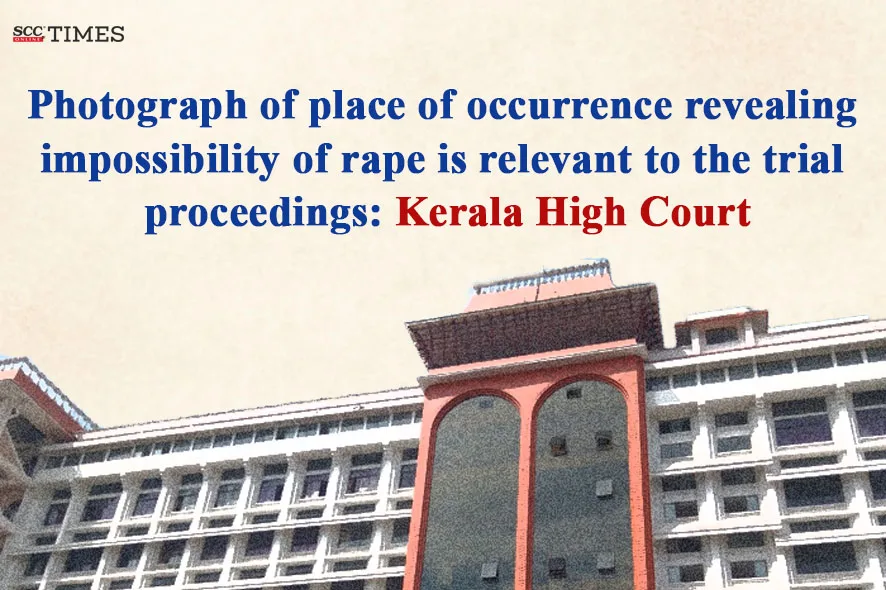Kerala High Court: The present petition challenged the refusal of the Additional Sessions Judge (‘Trial Court’) to permit the defence counsel to confront a witness during cross-examination by showing two documents which dealt with the place of occurrence of the offence, during a rape trial. A Single Judge Bench of G. Girish, J., held that a photograph depicting the interior of the place where the rape took place was not irrelevant to the proceedings and the Trial Court was wrong to refuse the defence counsel from asking questions related to it. The Court directed the Trial Court to permit the defence counsel to confront the prosecution witness with the said photograph.
Background:
The accused was alleged to have committed rape under the false promise of marriage and cheating under Sections 376(2)(n) and 420 of the Penal Code, 1860 (‘IPC’), respectively. He allegedly indulged in a sexual relationship with the survivor on the ground floor of a building which the lessor had leased to him for conducting a stitching unit. During the lessor’s cross-examination, he answered about the area of that building and its nature but stated that he did not know how many stitching machines were there in that building. At that time, the defence counsel attempted to confront the lessor by showing a photograph which was purportedly the interior portion of that shop containing various stitching machines.
The Trial Court refused permission to proceed with the lessor’s cross-examination based on the said document stating that the photograph did not pertain to the witness, or was not made by him, and hence did not fall within the purview of Section 145 of the Evidence Act, 1872 (‘Evidence Act’). The defence counsel tried to confront the lessor by showing the site plan prepared by the Village Officer, which formed part of the prosecution records, but it was also refused by the Trial Court stating that the site plan was not prepared by that witness. Aggrieved by the above interference, the accused filed the present petition for passing appropriate orders for redressing his grievance.
Analysis and Decision:
The Court opined that in a prosecution for the offence of rape, the building or the place where the sexual intercourse between the offender and the survivor took place, was one of the facts which constituted the state of things under which the occasion or cause of rape happened, and thus was relevant under Section 5 of the Bharatiya Sakshya Adhiniyam, 2023 (‘BSA’), corresponding to Section 7 of the Evidence Act. The Court further opined that a photograph of the place of occurrence, which purportedly revealed the impossibility of the commission of rape there, could not be said to be an irrelevant document, rather it was relevant under Section 7 BSA, corresponding to Section 9 of the Evidence Act. The Court thus observed that the questions put to the lessor where the crime allegedly took place and as to whether the photograph and the plan shown to him related to the building which he leased to the accused, were not irrelevant.
The Court relied on Criminal Trials Guidelines Regarding Inadequacies & Deficiencies, In re, (2021) 10 SCC 598, where the Supreme Court differed from the views laid down in Bipin Shantilal Panchal v. State of Gujarat, (2001) 3 SCC 1, and held that “the Presiding Officer should decide on objections to questions, during the course of the proceeding, or failing it, at the end of the deposition of the witness concerned. This would result in de-cluttering the record and would also have a salutary effect of preventing frivolous objections”. It was further observed that the Trial Court must decide the admissibility of the documents sought to be brought in evidence when the witness was cross-examined by confronting him about the contents of such documents, and must give due regard to the relevancy of such documents in the light of the pertinent provisions of the BSA or the Evidence Act.
The Court held that the Trial Court was wrong in disallowing the defence counsel from proceeding to confront the lessor by showing him the photograph of the interior portion of the building where the incident was said to have happened and also by showing the site plan prepared by the Village Officer.
Therefore, the Court allowed the petition and directed the Trial Court to permit the defence counsel to show the interior photograph of the leased building and the Village Officer’s site plan to the lessor and ask if they depicted the same premises. If the lessor gave an affirmative answer, the defence counsel must be permitted to ask further questions and mark the photographs as exhibits for the accused, subject to production of the documents immediately thereafter. However, if the lessor denied or was not sure, the defence counsel must not be allowed to ask any further questions on the documents.
[Anu C.R. v. State of Kerala, 2025 SCC OnLine Ker 10479, decided on 16-10-2025]
Advocates who appeared in this case:
For the Accused: A. Rajasimhan, Vykhari K.U., Advocates.
For the Respondent: Sudheer. G, Public Prosecutor.




